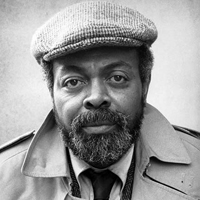In Memory of Radio by Amiri Baraka: Summary and Analysis
In Memory of Radio by the most respected and famous African-American poet Amiri Baraka was first published in Preface to a Twenty Volume Suicide Note in 1961. Written in free verse in conversational style, this poem primarily deals with the ideas of discrimination, technology, imagination, individuality and the poet’s role in the society. Radio has been a symbol of nostalgia or the sense of loss in the poem.

Amiri Baraka (1934-2014)
The first stanza opens with a rhetorical question, ‘Who ever has stopped to think of the divinity of Lamont Cranston?’ Cranston is the fictional superhero also known as The Shadow who with his superpower can change the mind of people. In the next line he answers his own question in a parenthetical way "(only jack Kerouac that I know of: & me)". The speaker excludes himself from the mass American who have been deceived by the radio, a modern technology and includes himself with the group of Jack Kerouac.
In the second stanza, the speaker twists a popular saying 'Tis better to have loved and lost than to have never loved at all’ to ‘What can I say? / It is better to have loved and lost / Than to put linoleum in your living rooms?’ here linoleum is a floor covering made up of materials such as solidified linseed oil, pine rosin etc. The speaker Changes the traditional idiom and gives a twist with meaning focusing that he would better love and dare to face the loss of love than to put the linoleum, a modern form of carpet then, in his room. He excludes himself here too from the crowd of the American who are running blindly towards the technologies.
In the third stanza, he uses ‘Satori’ a Japanese Buddhist term for enlightenment and ‘gas chamber’. The juxtaposition between the words ‘gas chamber’ and ‘satori’ is huge which means a genocidal enlightenment. The phrase is almost an oxymoron. The poet uses the pressure between the two words to focus on the dangerous consequences of saying and doing great things. It is said that Hitler had convinced his nation that killing off the whole ethnic group is good, we know the result of his hideous deed. The poet in this stanza wants to say that he does not have power like that of Hitler and Goody Knight, and he cannot speak like Oral Roberts and FJ Sheen.
He reveals that love is actually an evil when it is spelled backward ‘evol’ which sounds like evil. The speaker remembers one radio program in particular ‘Let’s pretend’. He still remembers and listens that program and through that program he makes the critic of contemporary American culture, American pretend to give love but pretension is after all a pretension. Behind the mask of love, evil lurks in their heart. He justifies this argument by turning the word love backward, which becomes ‘evol’. So, the problem lies in the American mainstream culture of love. He concludes the poem in an open ended form saying that ‘O, yes he does / O, yes he does / An evil word it is, / This Love’. The entire argument can be used in case of marginalized blacks as well Whites pretend to give love but contain evil within.
The poem criticizes on the treacherousness and the entrapping nature of radio that control over human thought and creates a false world. As a poet of the Beat generation, Baraka criticizes American values, cultures and the emerging love towards the technologies. In this memory, the speaker goes back to the decade of 40s and 50s when he used to listen the radio programs. The different radio characters and presenters have left the hypnotic power overt him. He still remembers those programs. Some used to teach the methods of being rich and other focused on healing power, enlightenment and transformation.
In his analysis of American culture, he even remembers Jack Kerouac, one of the important figures of the beat movement. The speaker and Kerouac have realized the falsity and pretension of American society. Radio is meant for awareness, consciousness raising, enlightenment and education, but the sorry thing is that the very means of education have become the source of hatred, jealousy, hypocrisy and pretension. It is teaching people to be unreal. They don’t show what they have and they show what they do not have. As a supporter of the beat movement, he criticizes the education system of American society.
The poem is primarily focused on the role of the poet and the undeniable power of the words to impress the mind of the readers and bring change. The poet brings many references from his childhood: The Shadow, Goody Knight, Oral Roberts, FJ Sheen, Kerouac, even Hitler to justify that the power of words can change the mind, culture and ultimately the world itself. He believes that as a poet, he can bring change through his words.
